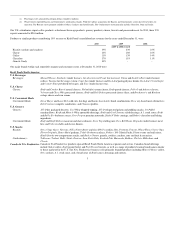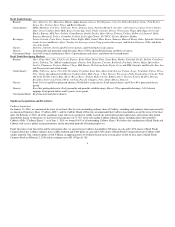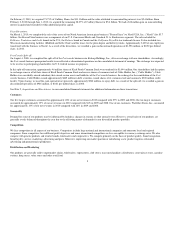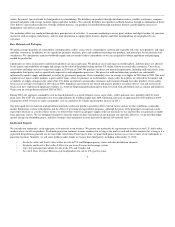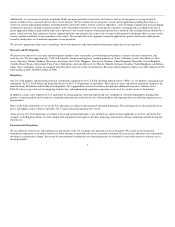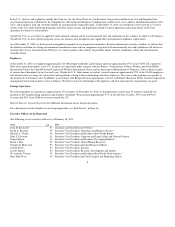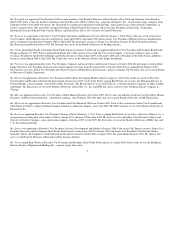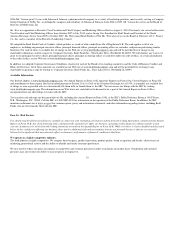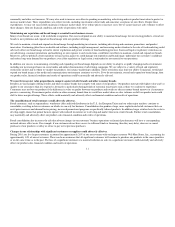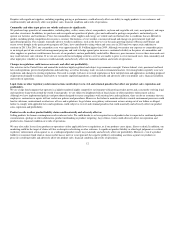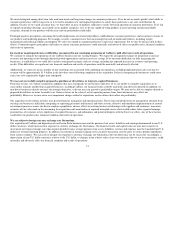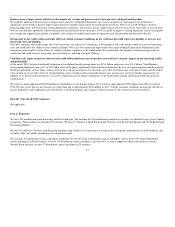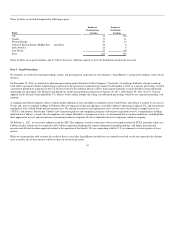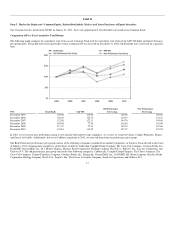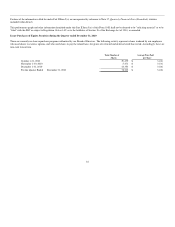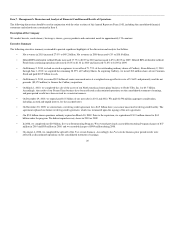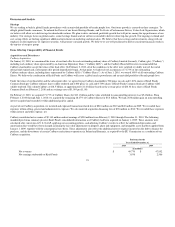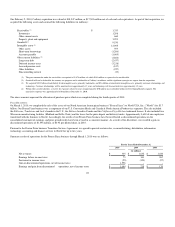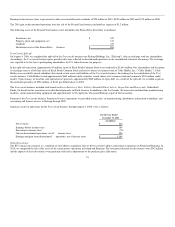Kraft 2010 Annual Report Download - page 16
Download and view the complete annual report
Please find page 16 of the 2010 Kraft annual report below. You can navigate through the pages in the report by either clicking on the pages listed below, or by using the keyword search tool below to find specific information within the annual report.
We are subject to risks generally associated with companies that operate in a global environment, which could affect our growth and financial
performance.
We generated approximately 57% of our 2010 net revenues, 49% of our 2009 net revenues and 50% of our 2008 net revenues outside the U.S. With
operations in more than 75 countries, our operations are subject to risks inherent in multinational operations. Those risks include:
• compliance with U.S. laws affecting operations outside of the U.S., such as the Foreign Corrupt Practices Act,
• compliance with a variety of local regulations and laws,
• changes in tax laws and the interpretation of those laws,
• fluctuations in currency values,
• sudden changes in foreign currency exchange controls,
• discriminatory or conflicting fiscal policies,
• difficulties enforcing intellectual property and contractual rights in certain jurisdictions,
• greater risk of uncollectible accounts and longer collection cycles,
• effective and immediate implementation of control environment processes across our diverse operations, and
• imposition of more or new tariff, quotas, trade barriers, and similar restrictions on our sales outside the U.S.
Moreover, political and economic changes or volatility, geopolitical regional conflicts, terrorist activity, political unrest, civil strife, acts of war, public
corruption and other economic or political uncertainties could interrupt and negatively affect our business operations. All of these factors could result in
increased costs or decreased revenues, and could materially and adversely affect our product sales, financial condition and results of operations.
Our operations in certain developing markets expose us to political, economic and regulatory risks.
Our growth strategy depends in part on our ability to expand our operations in developing markets, including Brazil, China, India, Mexico, Russia and
Southeast Asia. However, some developing markets have greater political and economic volatility and greater vulnerability to infrastructure and labor
disruptions than established markets. In many countries outside of the U.S., particularly in those with developing economies, it may be common for others to
engage in business practices prohibited by laws and regulations applicable to us, such as the Foreign Corrupt Practices Act or similar local anti-bribery laws.
These laws generally prohibit companies and their employees, contractors or agents from making improper payments to government officials for the purpose
of obtaining or retaining business. Failure to comply with these laws could subject us to civil and criminal penalties that could materially and adversely affect
our financial condition and results of operations.
In addition, competition in developing markets is increasing as our competitors grow their global operations and low cost local manufacturers expand their
production capacities. Our success in integrating Cadbury's operations and products, many of which have a strong presence in a number of developing
markets, is critical to our growth strategy. If we cannot successfully increase our business in developing markets, our product sales, financial condition and
results of operations could be materially and adversely affected.
Unanticipated business disruptions could affect our ability to provide our products to our customers.
We have a complex network of suppliers, owned manufacturing locations, co-manufacturing locations, distribution networks and information systems that
support our ability consistently to provide our products to our customers. Factors that are hard to predict or beyond our control, like weather, natural disasters,
fire, terrorism, generalized labor unrest or health pandemics, could damage or disrupt our operations, or our suppliers' or co-manufacturers' operations. If we
are unable to respond to disruptions in our operations, whether by finding alternative suppliers or replacing capacity at key manufacturing or distribution
locations, or are unable to quickly repair damage to our information, production or supply systems, we may be late or unable to deliver products to our
customers. If that were to occur, our customers' confidence in us and long-term demand for our products could decline. Any of these events could materially
and adversely affect our product sales, financial condition and results of operations.
We must correctly predict, identify and interpret changes in consumer preferences and demand, and offer new products to meet those changes.
Consumer preferences for food products change continually. Our success depends on our ability to predict, identify and interpret the tastes and dietary habits
of consumers and to offer products that appeal to consumer preferences. If we do not offer products that appeal to consumers, our sales and market share will
decrease and our profitability could suffer.
13


